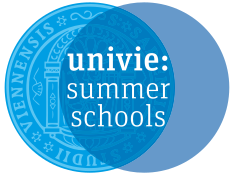
programme
Monday, September 8th:
09.00 – 09.15
General Introduction
Nicolas Robinson-Garcia, Universidad de Granada, Spain
09.15 – 09.45
Introduction to Bibliometric Data Sources
Elvira María González Salmón, Universidad de Granada, Spain
09.45 – 10.30
Accuracy and Beyond: Data Quality of Bibliometric Databases
Stephan Stahlschmidt, German Centre for Higher Education Research and Science Studies (DZHW), Germany
10.30 – 11.00
Coffee break
11.00 – 11.45
Designing Effective Queries for Document Retrieval
Stephan Gauch, Humboldt Universität zu Berlin, Germany
11.45 – 12.30
Data Cleaning & Integration
Cinzia Daraio, Sapienza University of Rome, Italy
12.30 – 13.30
Lunch break
13.30 – 14.00
Introduction to the Exercises
14.00 – 15.30
Exercises
15.30 – 16.00
Coffee break
16.00 – 17.00
Exercises
Tuesday, September 9th:
09.00 – 09.45
Scientometric Indicators in Use: an Introduction
Sybille Hinze, Berlin University Alliance, Germany
9.45 – 10.30
Indicators for Authors, Journals, and Other Entities
Dimity Stephen, German Centre for Higher Education Research and Science Studies (DZHW), Germany
10.30 – 11.00
Coffee break
11.00 – 11.45
Subject Normalisation for Citation Analysis
Wolfgang Glänzel, Centre for R&D Monitoring (ECOOM) & Faculty of Economics and Business, KU Leuven, Belgium
11.45 – 12.30
Altmetrics and Open Science
Nicolas Robinson-Garcia, Universidad de Granada, Spain
12.30 – 13.30
Lunch break
13.30 – 15.00
Exercises
15.00 – 15.30
Coffee break
15.30 – 16.30
Exercises
16.30 – 17.00
Clarivate Data and Tools for Bibliometric Analysis and Assessment: Key Highlights
Gabriela Balladares, Consultant for Research and Analytics Solutions, Clarivate
19.00 – 20.00
Guided Tour of the Albaicín, the Historic Heart of Granada
Wednesday, September 10th:
09.00 – 09.45
Research Collaboration Measured by Co-Authorship
Wolfgang Glänzel, Centre for R&D Monitoring (ECOOM) & Faculty of Economics and Business, KU Leuven, Belgium
09.45 – 10.30
The Application of Network Analysis in Science Studies: Common Theoretical Background for Broad Applications
Wolfgang Glänzel, Centre for R&D Monitoring (ECOOM) & Faculty of Economics and Business, KU Leuven, Belgium
10.30 – 11.00
Coffee break
11.00 – 11.45
Scientometric Tools: Overview and Examples
Wenceslao Arroyo-Machado, Universidad de Granada, Spain
11.45 – 12.30
Visualization Tools: Overview and Examples
Víctor Herrero-Solana, Universidad de Granada, Spain
12.30 – 13.30
Lunch break
13.30 – 15.00
Exercises
15.00 – 15.30
Coffee break
15.30 – 16.30
Exercises
16.30 – 17.30
The UCL/Knowledge Quarter Innovation District Dashboard
Jörg Hellwig, Senior Research Analyst, Elsevier
Thursday, September 11th:
Focus Topic Day: Responsible Metrics
09.00 – 09.45
Responsible Metrics in the Context of CoARA
Elizabeth Gadd, Head of Research Culture & Assessment, Loughborough University, UK
09.45 – 10.30
Responsible Metrics and their Application in Spain
Irene Ramos Vielba, National Agency for Quality Assessment and Accreditation (ANECA), Spain
10.30 – 11.00
Coffee break
11.00 – 11.45
Responsible Metrics and their Application in Italy
Menico Rizzi, Università del Piemonte Orientale, Italy
11.45 – 12.30
Principles of Evaluative Bibliometrics in the CoARA/DORA Context
Nicolas Robinson-Garcia, Universidad de Granada, Spain
Daniel Torres-Salinas, Universidad de Granada, Spain
12.30 – 13.30
Lunch break
13.30 – 15.00
Exercises
15.00 – 15.30
Coffee break
15.30 – 17.00
Agora
Responsible Metrics in Practice: Rethinking the Use of Bibliometrics in Research Assessment
Moderation:
Juan Gorraiz
Bibliometrics and Publication Strategies, University of Vienna, Austria
Elizabeth Gadd
Head of Research Culture & Assessment, Loughborough University, UK
Irene Ramos Vielba
National Agency for Quality Assessment and Accreditation (ANECA), Spain
Menico Rizzi
Università del Piemonte Orientale, Italy
17.00 – 17.30
How Does Dimensions Support Transparent and Open Evaluation
Jürgen Wastl, VP Research Evaluation and Global Challenges, Digital Science
19.00-22.00
Conference Dinner at La Chumbera with live Flamenco
Friday, September 12th:
Best Practices in Bibliometrics
09.00 – 09.45
Bibliometric Services Provided by Libraries: Basic Tasks and New Challenges
Juan Gorraiz, Bibliometrics and Publication Strategies, University of Vienna, Austria
09.45 – 10.30
AI-Enhanced Bibliometric Services at the University of Modena & Reggio Emilia (Unimore): Balancing Innovation and Responsibility in Research Evaluation
Nicola De Bellis, Bibliometric Office – University of Modena and Reggio Emilia, Italy
10.30 – 11.00
Coffee break
11.00 – 12.30
From Data to Decision-Making: Practical Insights into Bibliometric Services
Cinzia Daraio, Sapienza University of Rome, Italy
Sybille Hinze, Berlin University Alliance, Germany
Wenceslao Arroyo Machado, Universidad de Granada, Spain
12.30 – 13.30
Lunch break
13.30 – 14.30
Exercises Finalization
14.30 – 16.00
Students Presentation and Feedback
16.00 – 16.30
Farewell Coffee
The establishment of esss is very timely. The increasing use of bibliometrics for funding and evaluative purposes, and in international university rankings, makes it essential for more people to develop a detailed understanding of the disciplines strengths and weaknesses. The contributing partners in this new initiative are to be congratulated for putting together an outstanding program.

